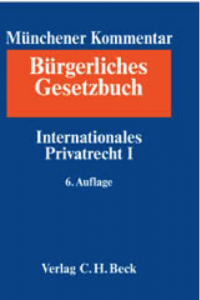The latest issue of the “Praxis des Internationalen Privat- und Verfahrensrechts (IPRax)” features the following articles:
R. Wagner, A new attempt to negotiate a Hague Convention on Recognition and Enforcement
In 1992 the United States of America proposed that the Hague Conference for Private International Law should devise a worldwide Convention on Recognition and Enforcement of Judgments in Civil and Commercial Matters. Especially the states of the European Union were in favor of harmonizing also the bases of jurisdiction. At the very end the Hague Conference was not able to finalize the negotiations of a convention with a broad scope including rules on bases of jurisdiction and on enforcement and recognition. On the lowest common denominator the conference concluded the Convention of 30 June 2005 on Choice of Court Agreements (Choice of Court Convention). This convention came into force on 1 October 2015 for Mexico and the European Union (without Denmark). The original idea of a convention with a broad scope has never been forgotten. The following article provides an overview of new developments in the Hague Conference and presents a preliminary draft text of the Working Group on the judgments project.
M.-Th. Ziereis/S. Zwirlein, Article 17 (2) EGBGB and the Rome III Regulation
According to Art. 17 (2) German Introductory Act to the Civil Code (EGBGB) within Germany a divorce may only be decreed by a state court. This prohibits private divorce. This essay shows that Art. 17 (2) EGBGB is a conflict of laws rule concerning the law applicable to the formal requirements of a divorce and can therefore be applied alongside the Rome III regulation.
A. Staudinger/C. Bauer, The concept of contract pursuant to Art. 15 (1) lit. c Brussels I Regulation (Art. 17 (1) lit. c Brussels Ia Regulation) in cases where usually intermediaries are involved – a de-limitation between package travel- and investment contracts
This contribution deals with a judgement of the ECJ referring to the concept of contract in the field of International Civil Procedure Law according to Art. 15 (1) lit. c Brussels I Regulation (Art. 17 (1) lit. c Brussels Ia Regulation). The decision is about the liability of an issuing bank based on the investment contract. It offers an occasion both to discuss the current jurisprudence and comparable constellations in law on package travel where intermediaries are involved, especially the Maletic-case. This jurisdiction anyway is not “overruled”. The European legal qualification of the relation between the consumer and the intermediary further on should be understood depending upon the certain circumstances, although a trend can be observed for a contractual comprehension. The judgement illustrates the division of labor between European and national judges and underlines the importance of the choice of the defendant. Depending on whether the claimant sues only one or both of the involved parties it might affect the possible place of jurisdiction. In the light of the present as well as of the Maletic-judicature it becomes apparent the mutual influence of the respective relations regarding the scope of application of Brussels Ia-Regulation respectively of the jurisdiction over consumer contracts.
Th. Pfeiffer, Tort claims as contractual obligations under the Brussels jurisdictional regime – Characterizing the main claim according to a preliminary question?
This article analyzes the ECJ’s recent Brogsitter-judgment. It explains that, under previous case law relating to art. 5 no. 1 Brussels I-Regulation 44/2001, this provision was applicable only if the underlying claim itself was based on a contractual obligation, whereas, under Brogsitter, it is also sufficient that an interpretation of the contract is indispensable for determining the lawfulness of the allegedly tortuous conduct. The article points out that this new concept amounts to a characterization of the main claim based on the nature of a preliminary question. In particular, the article analyzes the practical advantages and disadvantages of the ECJ’s new position with special regard to cases of concurring contractual and tort-related disputes. In its conclusions, the article favors recognizing that – contrary to the ECJ’s existing case law – the special headings of jurisdiction in article 5 should be interpreted as to permit the court to also adjudicate on other claims resulting from the same facts, even if the latter, because of their nature, are not directly covered by this particular jurisdictional heading.
P. Kindler, Jurisdiction and Directors’ Liability vis-a-vis the Company
In its sentence of 10 September 2015, the ECJ held that the application of Article 5 (1) and (3) of the Brussels I Regulation is precluded, provided that the defendant, in his capacity as director and manager of a company, performed services for and under the direction of that company in return for which he received remuneration (cf. Articles 18 to 21 of the Regulation). Furthermore, pursuant to Article 5 (1) of the Regulation an action brought by a company against its former manager on the basis of an alleged breach of his obligations under company law comes within the concept of “matters relating to a contract”. It is for the court to determine the place where the manager in fact, for the most part, carried out his activities in the performance of the contract. Finally, under Article 5 (3) of the Regulation, an action based on an allegedly wrongful conduct is a matter relating to tort or delict where the conduct complained of may not be considered to be a breach of the manager’s obligations under company law. The author welcomes the judgment as it points out clearly under which circumstances a manager is to be classified as a “worker” for the purposes of Article 18 (2) of the Regulation. The judgment is less clear with respect to Article 5 (3) of the Regulation.
M.-P. Weller/C. Harms, The shareholder’s liability for pre-entry charges in the light of Brussels I and EuInsVO
According to the German jurisprudence, the shareholders of a German Limited Liability Company are liable for all debts and pre-entry charges of the company arising in the period between the establishment of the company, i.e. the signing of the articles of association, and the subsequent registration in the company’s register. The following article discusses the international jurisdiction for claims of the company against its shareholders resulting out of the liability for pre-entry charges (= Vorbelastungshaftung).
M.-P. Weller/I. Hauber/A. Schulz, Equality in international divorce law – talaq and get in the light of Art. 10 Rom III Regulation
The following article discusses the principle of non-discrimination in international divorce proceedings. It especially focuses on Article 10 of the Rom III Regulation and draws attention to the question of whether the provision is meant to safeguard the principle of equal gender treatment in general or whether a case-by-case analysis is required in order to establish if the one of the parties has actually been treated unequally. Answering this question is of great importance with regard to both the Islamic “talaq” and divorce under Jewish Law.
D. Coester-Waltjen, Co-motherhood in South African Law and the German birth registry
Several legal systems – within and outside Europe – introduced rules which allow two partners of the same sex to be registered in the birth certificate as legal parents of a child. The number of these jurisdictions is growing – just recently being joined by Austria – up to then a system, which was relatively reluctant in the area of medically assisted reproduction and same sex unions. Although German criminal law does not forbid the artificial insemination of a woman living in a registered same sex partnership, family law rules do not provide a parental role for the female partner of the child’s mother except by step-child adoption. Nevertheless, German registrars and judges have to deal with birth certificates naming two women as parents of a child – more frequently in recent times. In almost all cases the birth certificates were issued in a foreign country. Do these documents have to be recognized, which questions of private international law are concerned, and which consequences may follow from this kind of parenthood, especially with regard to the nationality of the child?
The Berlin Court of Appeal had to deal with these issues. The facts of the case differ from those which had been presented to the Court of Appeal in Celle and in Cologne before. And this is true for the reasoning and the finding of the learned judges too. This article addresses the questions which conflict rules are applicable to a “parentage of choice”, which limitations have to be observed, and which consequences will follow from the established parentage.
A. Dutta, Trusts in Schleswig-Holstein? – A didactic play on transferring property under the wrong law?
The case note addresses the question of how a testamentary trust has to be interpreted in the applicable German succession law as a system without a trust tradition, considering also the new Succession Regulation and possible implications of the European fundamental freedoms on the recognition of foreign trusts.
C. Thomale, On the recognition of Californian Judgments of Paternity regarding surrogacy arrangements in Switzerland
The Swiss Supreme Court denied recognition of a Californian Judgment of Paternity, which declared an ordering parent lacking any genetic connection with the child to be the child’s legal father. The opinion feeds into current debates on surrogacy, notably reshaping the meaning of “best interest of the child”. The comment analyses the decision, based upon which a transnational need for reform is identified.
F. Temming, The qualification of the rules granting dismissal protection of employees according to sections 105, 107 of the Austrian Arbeitsverfassungsgesetz – is there finally a change of position regarding the case-law of the Austrian High Court of Vienna?
The Austrian High Court of Vienna has published two judgments on the topic of dismissal protection of employees. The cases deal with collective preventive dismissal protection and repressive individual dismissal protection granted by sections 105, 107 of the Austrian Arbeitsverfassungsgesetz. These rules cause problems in the realm of international jurisdiction and conflict of laws because they combine co-determination rights together with the rights of individual employees. The resulting question is how to qualify the pertinent sections for the purposes of international jurisdiction and conflict of laws. The two judgements are noteworthy because they put an end to the Court’s long standing case-law of qualifying these sections as being totally part of the law of co-determination. Instead, the applicable law is labour law. However much these new development can be welcomed the way of dealing with the works council right to be consulted before the employer terminates the employment contract is still subject to dogmatic criticism. There is a good case of characterising this matter as being only part of the law of co-determination and thus applying neither Art. 8 nor Art. 9 of the Rome I Regulation. With regards to the substantive law these two judgements give a good opportunity to revisit the prerequisites regarding the personal scope of the German Betriebsverfassungsgesetz in cross-border and external situations.
M. Dregelies, The lex auctoritatis in Polish and German law
Although agency is important and necessary in modern business life, a codification of the lex auctoritatis is missing in the Rome I Regulation and the German Private International Law (EGBGB). As a result, the lex auctoritatis has been developed by judicial lawmaking and the doctrine. In 2011 the Polish parliament passed a new code on private international law, including the first Polish codification of a lex auctoritatis. After a short overview of the Polish substantive law, this article illustrates the need for a change in the German court ruling by comparing the Polish with the German solution and pointing out their problems. The Polish codification is recommended as the start of a new discussion of a uniform European lex auctoritatis.
 Professor Dr.
Professor Dr.  Zurich; Volker Lipp, Göttingen).
Zurich; Volker Lipp, Göttingen).